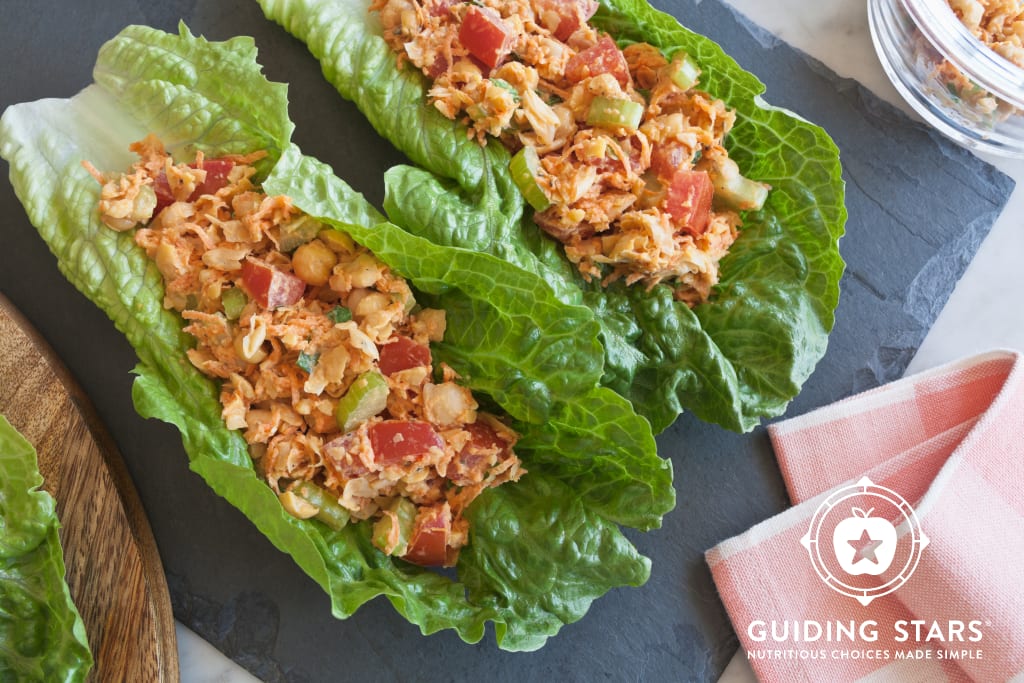For the typical omnivore, switching to a vegan diet which excludes red meat, fish, poultry, eggs, and dairy is a drastic lifestyle change. Without a foundational understanding of nutrition and key considerations for vegan eating, it’s easy to feel like your whole life just turned upside down. I’ve pulled together five common nutritional pitfalls for new vegans along with strategies to address them here.
Garbanzo Salad Romaine Wraps
The excellent flavor and texture in these wraps makes them a great starting place for a vegan meal.
View recipe »Unrealistic Expectations
A vegan lifestyle may appeal to you for a variety of reasons including a personal interest in animal welfare, sustainability, or perhaps you just want to improve your health or lose weight. If your decision is motivated by health and weight loss, it’s important to set realistic expectations for this change. It’s true that a vegan diet can be much lower in calories and promote weight loss due to eating more nutrient dense vegetables, fruits, and grains and less fat from meat and dairy products. However, it’s also possible for a vegan diet to contain too many highly processed foods with simple carbs, unhealthy fats, added sugars, and salt. The key here is to focus on replacing meat and dairy in your diet with nutrient dense foods like beans, nuts, seeds, and unsweetened plant milks.
Radical Change
Vegan eating is even more restrictive than vegetarian eating, so a gradual transition towards more plant-based eating may be more feasible. You can start small by adopting something like a Meatless Monday challenge or making one of your daily meals meatless and dairy-free. It might work best to start adapting the dishes you already make and eat often. Perhaps you just need to swap in beans, soy foods (edamame, soy milk, tofu), or a hearty vegetable like mushrooms to replace meat. Our versatile Cashew Cheese Sauce can serve as a delicious replacement to cheese.
Unbalanced Meals and Snacks
If you share with friends or family that you are considering a vegetarian or vegan diet, you are guaranteed to have someone worried that you will not have enough protein in your diet if you make the change. Rest assured, research shows that vegetarian, including vegan, diets typically meet or exceed recommended protein intakes if a person is consuming the right amount of calories. Yet, it is important to think about how you will balance your meals and snacks when meat and dairy is no longer there, since the protein and fat they provide helps keep us full and satisfied. Protein-rich legumes and high fiber fruits, vegetables, and whole grains are your solution.
Vegan Meats
First, not all veggie meats are vegan, so you will want to double-check before making a purchase. Also, the nutritional facts of these vegan burgers, deli meats, hot dogs, or chicken nuggets products tell us they might not be the best choice despite their growing popularity and the “health halo” that surrounds them. Our vegan coworkers describe these as transition foods that can help fill a craving that people might encounter early into their new vegan lifestyle. Guiding Stars can help you navigate towards a more nutritious choice here.
Overlooking Essential Vitamins and Minerals
There is evidence to show that vegan diets do not contain vitamin B12, an essential nutrient. Our dietitian, Allison Stowell, dives more into this topic here, but your doctor might suggest a supplement when you discuss this change.
Other nutrients of concern for vegans include calcium and vitamin D, iron, and omega-3 fatty acids. Of course, the need for supplementation of these nutrients depends on your individual health and diet, but your doctor or a dietitian can help advise you. Just be aware that these nutrients are more challenging to get in a vegan diet so they require special attention.
